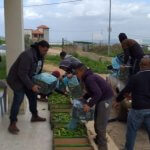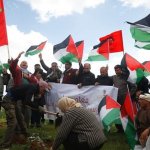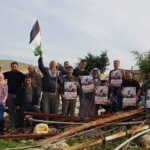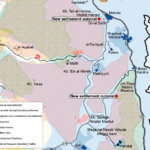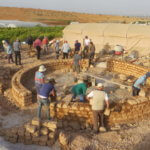Jordan Valley Solidarity calls on UN to act against ethnic cleansing
This article was first published by Amelia Smith in Middle East Monitor on 6th June 2014
On 28th May 2014 seventy men, women and chidlren from the Jordan Valley gathered outside the UN office in Ramallah and delivered a letter to Ban Ki-Moon: “We write to you to ask urgent action against Israel’s systematic policy of forced transfer and ethnic cleansing of the Palestinian people, in particular the Palestinian farmers and Bedouin communities and communities located in the so-called Area C of the occupied West Bank,” posed the letter.
The protests began after the houses and animal enclosures of thirteen families in Abu Al Jaj Refugee Camp in the Jordan Valley were demolished. It was said that their homes were too close to the Israeli settlement Ntsuwah.
Some 20 years ago, under the Interim Agreement, the West Bank was divided into three areas A, B and C. Most of the Jordan Valley falls under Area C, over which Israel has retained almost complete control. Israel severely restricts Palestinian construction and development in Area C yet Israeli settlements, closed military zones and nature reserves make up around 94 per cent of the Jordan Valley.
Palestinians living there are pushed out through demolitions, military harassment, and limitations on resources and movement. In 2014 alone 248 structures were demolished, 492 people displaced and 802 Palestinians injured by the Israeli army.
“Their ongoing prerogative is to ethnically cleanse the area,” says Rasheed Khudairi, co-ordinator of the Jordan Valley Solidarity Campaign.
Khderat says that authorities do give people notice before they demolish their houses, but sometimes only a few days. That only leaves a short space of time to work with lawyers to save their homes. “As a side note,” says Rasheed, “the Palestinian Authority should pay a lawyer for the communities under demolition threat, but most of the time they don’t.”
“Israel does not provide alternative housing,” he continues, “as they want Palestinians to leave the area. Some people have to move to nearby cities in Area A such as Tubas or Jericho. Others chose to stay on their land living in tents and temporary barracks. Sometimes materials for such emergency housing is donated by NGOs or provided by the UN but it almost never arrives fast enough and usually does not cover the amount of people in need.”
The Jordan Valley shares a border with Jordan, it has rich land for agriculture and a lot of water. But transportation routes to agricultural land and water resources mean that Palestinians find it hard to take advantage of this. In the meantime, Israeli settlements have been able to develop profitable businesses.
“All of the Israeli settlements in the valley are agricultural, producing products such as dates, oranges, bananas, etc,” says Khderat. “Israel provides them with free water, electricity, and land making their production costs far below average. This undercuts the price of the product thus serving the interests of Israel as well as its markets in Europe and the United States.”
“Water is a main resource in the valley, coming from the Jordan River, the Dead Sea, and many fresh springs. Israel controls all the water, providing it to the settlers for free and severely limiting Palestinian access to the resource. Palestinians are also prevented from collecting rain water and digging wells deeper than 150 metres. Israelis often dig deeper wells right next to Palestinian wells thus collecting all the water in the area rendering the Palestinian wells useless.”
Israeli authorities have separated communities in the Jordan Valley from each other through a series of military firing zones and checkpoints, making it difficult for them to come together to resist. “This has made unification of the valley difficult,” says Rasheed. Jordan Valley Solidarity are working on a popular council to unify activists in the valley, of which he says more and more people are becoming involved in.
“The international community is quite ignorant of the situation. Most media and aid focuses on areas A and B, claiming that area C is under Israeli law so they cannot do anything. Many people, even in Palestine, are unaware of the importance and value of the Jordan Valley, as mentioned above.”

